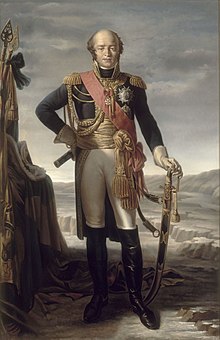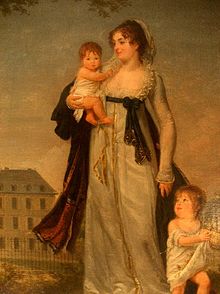Louis-Nicolas Davout
Louis-Nicolas d'Avoût , called Davoût , also written Davoust in older German texts , duc d'Auerstedt, prince d'Eckmühl et de l'empire (born May 10, 1770 in Annoux , Yonne department , Burgundy ; † June 1 1823 in Paris ) was a French general, peer and maréchal d'Empire . He is considered one of Napoleon's best generals . Because of his rigor and discipline he was nicknamed "the iron marshal" and because of his strict regiment as governor general of the Hanseatic departments based in Hamburg (1813–1814) he was called the " Robespierre of Hamburg".
Military background
Davout came from a respected noble family, was a classmate of Bonaparte in Brienne and in 1788 became Sous lieutenant in the Regiment Royal-Champagne Cavalerie . He joined the revolution with enthusiasm and in 1791 became chief of a volunteer battalion. He fought with honors under Dumouriez in the Battle of Jemappes and the Battle of Neer winds and issued an energetic proclamation to the army on Dumouriez 'apostasy. In July 1793 he was promoted to Général de brigade , but then had to leave the army because a decree excluded all former nobles from the army.
After the 9th Thermidor , he joined the Armée de la Moselle (Moselle Army) with his previous rank , fought under Pichegru in the Rhine Army in 1795 , was captured when Mannheim fell , but was exchanged again after a few months and distinguished himself under Moreau when crossing the Rhine (April 20, 1796).
Then he fought in Italy under Bonaparte, whom he also accompanied to Egypt . There he won his trust as a cavalry general and on his return in 1800 he became the general de division and commander in chief of the cavalry of the Italian army , after the battle of Marengo he was in command of the grenadiers of the consular guards , and after Napoleon I ascended the throne, he was marshal of the empire and commander of the appointed imperial guard .
In October 1805 Davout commanded the 3rd Army Corps in Austria and led the right wing in the Battle of Austerlitz . In October 1806 he operated independently with the right wing of the Grande Armée and defeated the main Prussian army on October 14 in the battle of Auerstedt . Therefore raised to Duke of Auerstedt , he took part in the battles at Eylau , Heilsberg and Friedland in East Prussia and was appointed Governor General of the Duchy of Warsaw .
In the new war with Austria in 1809 he was victorious on April 22nd at Eggmühl , commanded the right wing in front of Markgrafneusiedl in the battle of Wagram and made a significant contribution to the victory by bypassing the enemy via Obersiebenbrunn . After the peace, Napoleon made him Prince of Eggmühl and in 1811 Governor General of the Départements des Bouches de l'Elbe .
In the Russian campaign in 1812 , he commanded the 1st Corps, defeated Pyotr Ivanovich Bagration near Mogilev on July 23, 1812, and through skillful movements caused General Dochturov's corps to be cut off from Bagration's troops and the Western Army under Barclay de Tolly and almost wiped out. After the unfortunate retreat, he organized his troops in Saxony and then turned to the lower Elbe. In Meißen he deliberately had the Elbe bridge burned down on March 13, 1813 .
On May 30, 1813, he moved into the city of Hamburg, which had been occupied by General Tettenborn , and imposed a fine of 48 million francs on it as a punishment for deserting France , which he largely enforced with merciless severity. On November 5th he left the bank with a cash balance of 7,489,343 marks Bko. seize it, drive more than 20,000 people out of town towards the end of the year and burn down the homes of more than 8,000 residents after previously punishing several troublemakers with death.
As cruel as this procedure was, his defense against the Allies was militarily successful, who enclosed and besieged him on all sides after the final defeat of the Grande Armée in the Battle of Leipzig . On the orders of Louis XVIII. he surrendered the city - almost two months after Napoleon's abdication - on May 29, 1814, as his armed forces were decimated by diseases and shortages.
After Napoleon's return in 1815, he became Minister of War . When the allies advanced against Paris after the victory at Waterloo , he, appointed Commander- in -Chief by the Houses of Parliament , concluded a military convention with Blücher and Wellington on July 3 , after which he led the French army behind the Loire , where he himself settled on July 14, Louis XVIII. subjugated, also called on the army to do so, and handed over command to Marshal MacDonald .
Unlike General Ney , Davout did not have an oath under Louis XVIII. done. Ney had defected with his troops to Napoleon and was sentenced to death for high treason († December 7, 1815). Davout was exiled to Louviers on December 27, 1815 . During his exile the family was without any income. The claim to the foreign possessions which Davout had received from Napoleon was lost, and Davout no longer received his remuneration. His wife, Aimée Davout, finally managed to leave his exile on June 21, 1816 and return to his family in Savigny . The king finally granted him his salaries again and appointed him Marshal of France . Davout spent the last years of his life in Savigny. In 1822 he was elected mayor of the city of Savigny. Louis-Nicolas Davout died on June 1, 1823 in Paris.
family
In 1791 Davout married Adelaide Séguenot (1768–1795). The marriage was divorced again in 1794. On November 8, 1801, Louis Nicolas Davout married Louise-Aimée-Julie Leclerc (1782–1868), sister of General Victoire Emmanuel Leclerc . The marriage had eight children, four of whom died in early childhood. During the first 14 years of their marriage, Aimée and Louis-Nicolas Davout lived mostly separately from each other. France was not at war for only 18 months during this period. Letters passed back and forth between the couple almost every day. Some of the letters have been preserved and show Davout as a very affectionate and loving husband and father. The youngest daughter Adélaïde-Louise d'Eckmühl de Blocqueville published a biography and her father's letters in 1879. In 1802 Louis-Nicolas and Aimée Davout bought a castle in Savigny-sur-Orge . Thanks to financial donations from Napoleon, they were able to acquire the Hôtel de Monaco on Rue Dominique in Paris in January 1808. Aimée Davout died on December 16, 1868 at the age of 86, also in Paris. The grave of Louis-Nicolas and Aimée Davout and their daughter Antoinette Joséphine is in the Père Lachaise cemetery in Division 28.
Honors
His name is entered on the triumphal arch in Paris in the 13th column. In 1805 he was awarded the Grand Cross of the Legion of Honor . In 1819 he was promoted to peer of France .
He was Colonel général des Grenadiers à pied de la Garde impériale .
literature
- Paul Holzhausen: Davout in Hamburg : a contribution to the history of the years 1813–1814 / from a friend of historical truth. Mülheim (Ruhr): Röder, 1892
- Karl Bleibtreu : Marshals, generals, soldiers of Napoleon I. VRZ, Hamburg 1999, ISBN 3-931482-63-4 (repr. Of the Berlin 1898 edition).
- Pierre Charrier : Le maréchal Davout . Edition Nouveau Monde, Paris 2005, ISBN 2-84736-111-1 .
- John G. Gallaher: The iron marshal. A biography of Louis N. Davout . Greenhill Books, London 2000, ISBN 1-85367-396-X .
- Frédéric Hulot : Le maréchal Davout . Pygmalion, Paris 2003, ISBN 2-85704-792-4 .
- Helmut Stubbe da Luz : "French times" in Northern Germany (1803-1814). Napoleon's Hanseatic Department , Bremen 2003 ISBN 3-86108-384-1 .
- Alain Felkel : Louis Nicolas Davout. The genius behind Napoleon's victories . Osburg Verlag 2013, ISBN 978-3-95510-026-1 .
- Gabriele Hoffmann : The ice fortress. Hamburg in the cold grip of Napoleon. Munich, Piper, 2013. ISBN 978-3-492-30183-1
- Louise Adélaïde de Blocqueville: Le Maréchal Davout, prince d'Eckmühl . Raconté par les siens et par lui-même. Didier, Paris 1879, OCLC 69053646 .
Web links
- Literature by and about Louis-Nicolas Davout in the catalog of the German National Library
Individual evidence
- ↑ Louise Adélaide de Blocqueville: Le Maréchal Davout, prince d'Eckmühl: raconté par les siens et par lui-même . Paris 1879
- ↑ The oh so good person from Savigny in FAZ of November 12, 2013, page 26
| predecessor | Office | successor |
|---|---|---|
|
Henri Clarke d'Hunebourg |
Minister of War of France March 20, 1815 - July 7, 1815 |
Laurent de Gouvion Saint-Cyr |
| personal data | |
|---|---|
| SURNAME | Davout, Louis-Nicolas |
| ALTERNATIVE NAMES | Avoût, Louis-Nicolas d '; Davoût, Louis-Nicolas; Davoust, Louis-Nicolas; Auerstedt, Louis-Nicolas duc d '; Eckmühl, Louis-Nicolas prince d ' |
| BRIEF DESCRIPTION | French general, peer and marshal of France |
| DATE OF BIRTH | May 10, 1770 |
| PLACE OF BIRTH | Annoux , Burgundy |
| DATE OF DEATH | June 1, 1823 |
| Place of death | Paris |



